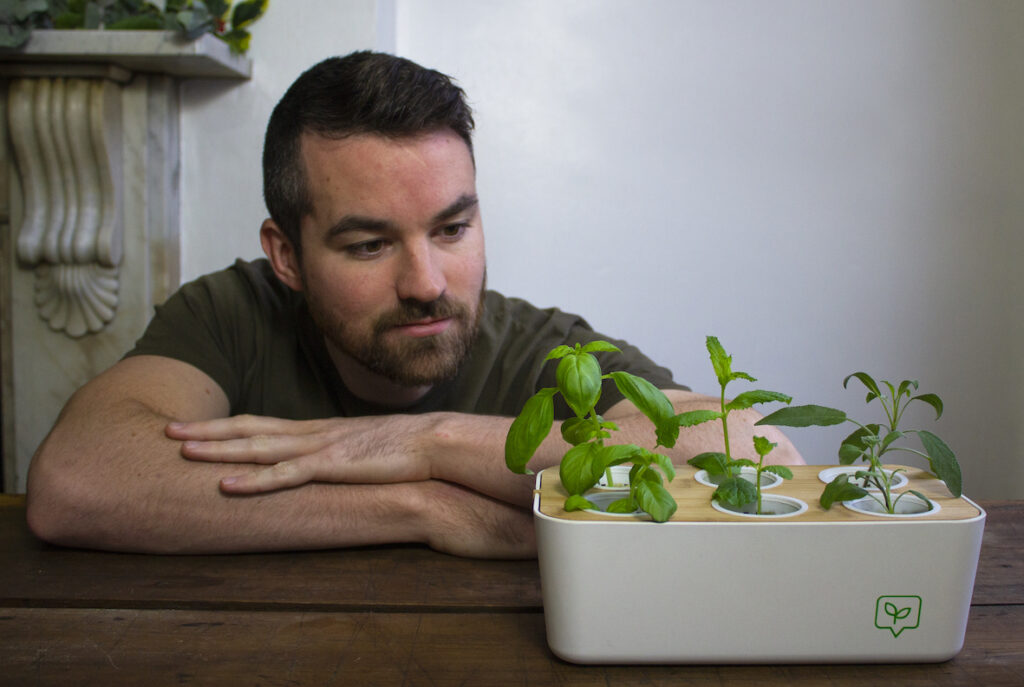Man behind “Airbnb for gardens” invents world’s most sustainable hydroponic planter

THE architect and entrepreneur behind the AllotMe platform – described as the ‘Airbnb for gardens’ – has invented the world’s most sustainable hydroponic planter, the GrowPod.
The GrowPod allows people to cheaply and sustainably grow fruit and vegetables in their own homes with no need for soil or electricity – and he believes it could help save the planet.
The new low-tech, grow-at-home kit has everything home gardeners need to get growing in one box complete with seeds. At £32, it’s less than a third of the typical cost of hydroponic planters – and it’s made from bamboo, rather than plastic.
Founder Conor Gallagher, 30, a Glasgow School of Art-trained architect from Belfast now living in London, is on a mission to ensure anybody can ‘grow their own’ – no matter where they live – and his latest invention means space and cost will no longer be a barrier for people in cities across the UK.
One of many key markets for the GrowPod is London – the UK’s most densely populated city – where more than 50% of apartments have no outdoor space at all.
The average apartment in the UK capital comes at no more than 50m2 – that’s roughly three-and-a-half times the size of a parking space – meaning finding room indoors to even start growing can be a huge challenge. It is precisely the type of problem GrowPod has been developed to solve.
The GrowPod from AllotMe uses 90% less water than traditional indoor growing methods, without the need for artificial lighting. Its innovation comes in a hydroponic growing method that uses a body of water instead of soil, which helps plants grow bigger and more frequently.
The method is more sustainable than vertical farming – where crops are grown indoors in stacked layers also using hydroponics – because it doesn’t use artificial light on its plants.
The value of the global vertical farming market was estimated at $2.9bn in 2019 and is estimated to grow to almost $12bn by 2027*. However, the produce is often unaffordable to many consumers.
That’s why Conor wants to help consumers grow at home, so that everyone can enjoy sustainable, seasonal produce.
Conor, who learned from the pitfalls of vertical farming and other hydroponic planters in the market, to develop the product, said: “By making it as easy as possible for every consumer to grow for themselves we can create a behaviour change which has the potential to save the planet.
“After I moved to London from Glasgow, I saw how people wanted to eat healthily and ethically, but it wasn’t affordable to do so. Most people I knew had no garden, and hardly any indoor space. By using hydroponics, the technology of vertical farms, there’s no need for soil which makes the plant far more space efficient.
“By growing even a small bunch of salad herbs at home, every household can have a direct relationship with the food they eat and where it comes from.
“We hope that for every purchase of a GrowPod, comes a reflection on the impact that can be made by every individual through their day-to-day choices.
“Because when we start on the journey of growing our own food, not only our fingers, but our lives become a little bit greener.”
“This method also means 90% less water is used, which gets better yield from your crop and ultimately contributes to fewer carbon emissions.”
Penny Macbeth, Director of The Glasgow School of Art, said: “Our graduates use their creative education and ability to think innovatively to give shape to ideas and to start new businesses.
“Conor’s design is particularly important because it addresses two key issues facing society – access to affordable, healthy food and climate change.
“We wish him every success as he takes this exciting product to market.”
Conor, who also studied at Belfast School of Architecture from 2008-2011, added: “My training allowed me to approach problems differently. It’s ingrained in me to identify an issue and not stop until I’ve devised a solution. It was a massive driver behind AllotMe, and GrowPod is borne out of the same instinct.
“As an architect, I’m acutely aware of space, and that played a significant role in the GrowPod – the use of clever and careful design to break a barrier to growing fruit and vegetables for so many people.”




